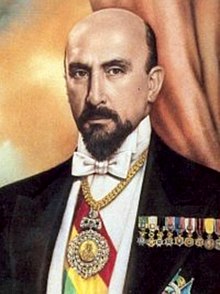Mamerto Urriolagoitía
| Mamerto Urriolagoitia | |
|---|---|
 |
|
| 50th President of Bolivia | |
|
In office 22 October 1949 – 16 May 1951 |
|
| Preceded by | Enrique Hertzog |
| Succeeded by | Hugo Ballivián |
| Vice President of Bolivia | |
|
In office 10 March 1947 – 24 October 1949 |
|
| President | Enrique Hertzog |
| Preceded by | Julián Montellano |
| Succeeded by | Hernán Siles Zuazo |
| Personal details | |
| Born |
Mamerto Urriolagoitia Harriague 5 December 1895 Sucre, Bolivia |
| Died |
4 June 1974 (aged 78) Sucre, Bolivia |
| Nationality | bolivian |
| Political party | Republican Socialist Unity Party |
Mamerto Urriolagoitia Harriague (December 5, 1895 – June 4, 1974) was President of Bolivia from 1949 to 1951. Of privileged background, he studied in France and later joined the Bolivian diplomatic service. In 1947 Urriolagoitia was elected Vice-President to Dr. Enrique Hertzog and endured the constant pressures for reform emanating from the poorest sectors of society. A hard-liner when it came to dealing with the opposition, he was preferred by the threatened conservatist elites (some would say the forces of reaction), who in 1949 forced President Hertzog to resign. Thus, Urriolagoitia became chief executive and immediately stepped up the repression of the reformist movement which was growing around the Movimiento Nacionalista Revolucionario (Nationalist Revolutionary Movement) of Víctor Paz Estenssoro, Juan Lechín, Hernán Siles Zuazo, and others. A counter-reaction took place and a series of violent nationwide rebellions catalyzed the so-called Civil War of May–September 1949. The Urriolagoitia government barely regained control of the situation, but the die was cast on the moribund "Oligarchic State" of 1880-1936, resuscitated only temporarily (1940–43 and 1946–52) by the economic and mining interests that upheld it.
In the 1951 presidential elections, time finally caught up with the old system, and the opposition party, led by Víctor Paz Estenssoro, was declared the winner, despite the fact that under the law only about 200,000 privileged, educated, and propertied Bolivians could vote.
Urriolagoitia refused to give power to Paz Estenssoro. Instead he installed the head of the Bolivian military, General Hugo Ballivián Rojas as President on May 16, 1951 thus inflicting a coup against the democratic order. This came to be known as the "Mamertazo" of 1951. With the elections annulled and Ballivián firmly installed in the Palacio Quemado, Urriolagoitia left the country. Retired from politics, he returned in later years and died in his native Sucre on June 4, 1974, at the age of 78.
...
Wikipedia
